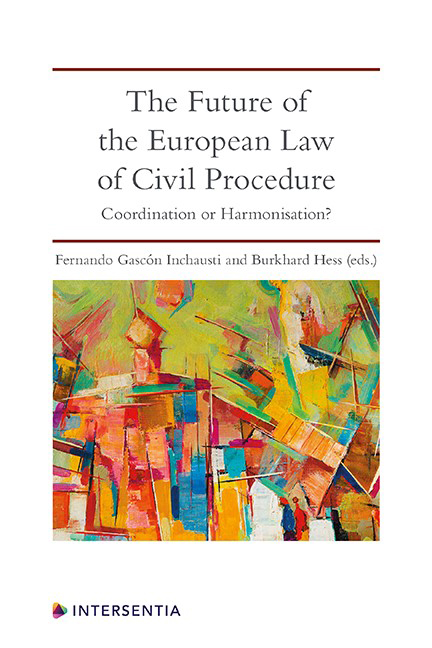Book contents
- Frontmatter
- Contents
- List of Cases
- List of Authors
- Introduction
- PART I METHODOLOGICAL APPROACHES
- PART II THE CURRENT SITUATION: VERTICAL AND HORIZONTAL HARMONISATION
- PART III CURRENT INITIATIVES FOR FURTHER HARMONISATION: The ELI/UNIDROIT Project
- The 2017 Directive Proposal on Common Minimum Standards of Civil Procedure
- Index
- ABOUT THE EDITORS
The ELI/UNIDROIT Project: A General Introduction
Published online by Cambridge University Press: 23 July 2020
- Frontmatter
- Contents
- List of Cases
- List of Authors
- Introduction
- PART I METHODOLOGICAL APPROACHES
- PART II THE CURRENT SITUATION: VERTICAL AND HORIZONTAL HARMONISATION
- PART III CURRENT INITIATIVES FOR FURTHER HARMONISATION: The ELI/UNIDROIT Project
- The 2017 Directive Proposal on Common Minimum Standards of Civil Procedure
- Index
- ABOUT THE EDITORS
Summary
More or less, readers will know what the ELI/Unidroit project is about, and therefore this introduction should be somewhat brief. The project was inaugurated in 2013 in Vienna and is still ongoing, with a view to being completed in May 2019 (at least, this is the completion date that appears on the ELI website). The official title of the project is “From Transnational Principles to European Rules of Civil Procedure“, and the reference to transnational principles makes it clear that the basis of the project, meaning the canvass on which the different working groups that have been established are supposed to work (although not exclusively), rests on the Transnational Principles and Rules of Civil Procedure that were the product of a joint venture between the ALI (American Law Institute) and Unidroit at the end of the last century and the first years of the present one. The ALI/Unidroit project was intensely discussed in academic circles all around the world; it was translated into a variety of languages, and it gave rise to a huge amount of scholarly writing. Unfortunately though, it never went beyond the stage of an intellectual endeavour and a remarkable exercise in the study of comparative civil procedure, considering that the aim of the project was to combine the best and most efficient aspects of litigation according to both the civil law and common law traditions in a set of rules that – if adopted – would help parties litigate in other national jurisdictions with the peace of mind provided by a system of rules and principles that were uniform throughout the whole world. The project was certainly ambitious, maybe too ambitious at that time, and therefore it was never taken into account by any institutions, either national ones or international ones.
Maybe now the time is ripe for a new attempt at devising common procedural principles, on a smaller scale, meaning at the European Union level. In fact, the European institutions, originally involved in the ELI/Unidroit project simply as observers, in the last couple of years have shown a deeper interest in the project, producing a variety of documents in which aspects of the project are under scrutiny.
- Type
- Chapter
- Information
- The Future of the European Law of Civil ProcedureCoordination or Harmonisation?, pp. 199 - 204Publisher: IntersentiaPrint publication year: 2020

